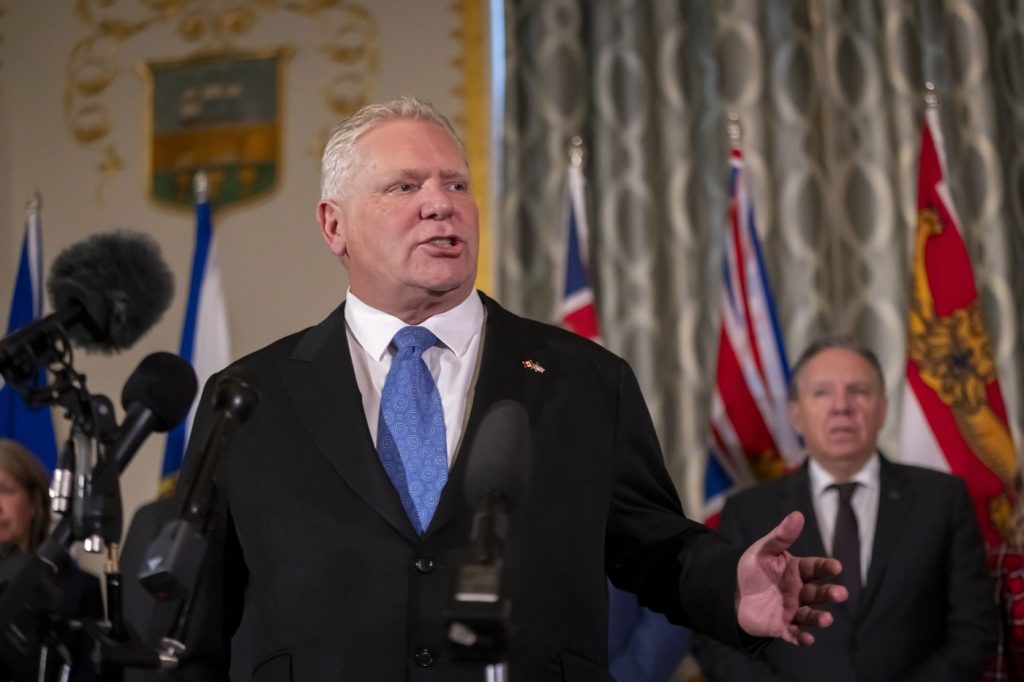Premiers Ford and Houston appeal to governors in latest push to stop Trump’s tariffs

WASHINGTON — Ontario Premier Doug Ford and Nova Scotia Premier Tim Houston were looking for allies among state governors in Washington, D.C. Friday as U.S. President Donald Trump swore in the man set to oversee his massive trade agenda.
“You’re going to see things that you’ve never seen before at a level you’ve never seen before,” Trump said as Howard Lutnick officially became the U.S. Secretary of Commerce.
“And Howard’s going to lead that charge.”
Advertisement
Finance Minister Dominic LeBlanc has been in contact with the billionaire financier since late last year, when they met at Mar-a-Lago after the president made his initial threats to impose sweeping tariffs on imports. LeBlanc and Lutnick met again at the White House last week as the deadline to avert Trump’s tariffs inched closer.
Trump’s executive order to implement devastating duties on all Canadian imports to the United States was paused until March 4 after Canada agreed to introduce new security measures at the border.
The president said it would allow time to reach a “final economic deal.”
The latest diplomatic push from premiers at the National Governors Association winter meeting on Friday brought little insight into what Trump ultimately wants to see from Canada before his next tariff deadline.
“That’s the ironic thing,” Ford said. “No one down here knows what he wants and we don’t know what he wants.”
Advertisement
Kentucky Gov. Andy Beshear said he’s been telling members of the Trump administration that tariffs would be harmful to Americans and Canadians.
“This might be the approach of one president, but we’re much bigger than a president,” Beshear, a Democrat, told reporters. “In this country, we have governors, we have multiple branches of government and I certainly hope we can move past this and get back to the relationship we had before.”
Canada has vowed that if the tariffs are implemented, it will hit back with a package of retaliatory levies on billions of dollars worth of American goods. Those tariffs would target everyday items, including American beer, orange juice and bourbon — a key Kentucky export.
Friday’s meeting came the week after all 13 premiers travelled together to the U.S. capital, where they were warned by Trump’s aides that the president is serious about annexing Canada.
Houston — who wore a Canadian hockey jersey to the governors’ Thursday dinner ahead of Canada’s triumph in the 4 Nations tournament — said there’s still “respect for Canada” among American lawmakers.
Advertisement
Canadian diplomacy is making progress, Houston said. American politicians are receptive to Canada’s border plan, he said, and they are recognizing the deep integration between the Canadian and U.S. economies.
Trump’s first month in office has seen him push through changes at breakneck speed and use tariff threats in an attempt to realign global trade.
Trump added to his list Friday, signing an executive action that could lead to levies on countries that impose a digital services tax on U.S. technology companies.
The U.S. regards Canada’s three per cent digital services tax, which came into effect last summer, as a major trade irritant.
Friday’s memorandum directs the U.S trade representative to determine whether to pursue a panel under the Canada-U.S.-Mexico Agreement (CUSMA) due to the Canadian tax. The Biden administration previously requested trade dispute settlement consultations under the trade pact because of Canada’s digital services tax.
Advertisement
The president signed an executive order last week to implement “reciprocal tariffs” by raising U.S. duties to match the tax rates that other countries charge on imports, which could come into force in April.
That comes in the wake of Trump’s previous orders to impose 25 per cent tariffs on all steel and aluminum imports into the United States starting March 12.
Trump also has floated the idea of tariffs on automobiles and forest products.
Canada has been caught repeatedly in the crosshairs of Trump’s focus on tariffs. The president continues to voice the false claim that the U.S. subsidizes Canada to the tune of US$200 billion per year.
Canada accounts for one of the United States’ smallest trade deficits, which is largely the result of U.S. demand for Canadian energy products. Canada is also the largest export market for the U.S.
Advertisement
Secretary of State Marco Rubio said the United States allowed uneven trade imbalances to develop for decades.
“The days where we just allow countries to take advantage of us — that has to end. That’s not good for the global order,” Rubio said in an interview with Catherine Herridge for X published Thursday.
“That leads to unbalances that create friction points. That’s the case with Canada.”
Experts and Canadian leaders have said that Trump’s tariff threats are likely a negotiating tactic meant to rattle Canada and Mexico ahead of a 2026 review of the trilateral continental trade pact.
CUSMA was negotiated to replace the North American Free Trade Agreement during the first Trump administration.
Advertisement
“We just have to get through this, get this (CUSMA) moved forward as quickly as possible,” Ford said.
“We need certainty because without certainty … a lot of companies are wavering back and forth.”
This report by The Canadian Press was first published Feb. 21, 2025.
Kelly Geraldine Malone, The Canadian Press
Advertisement